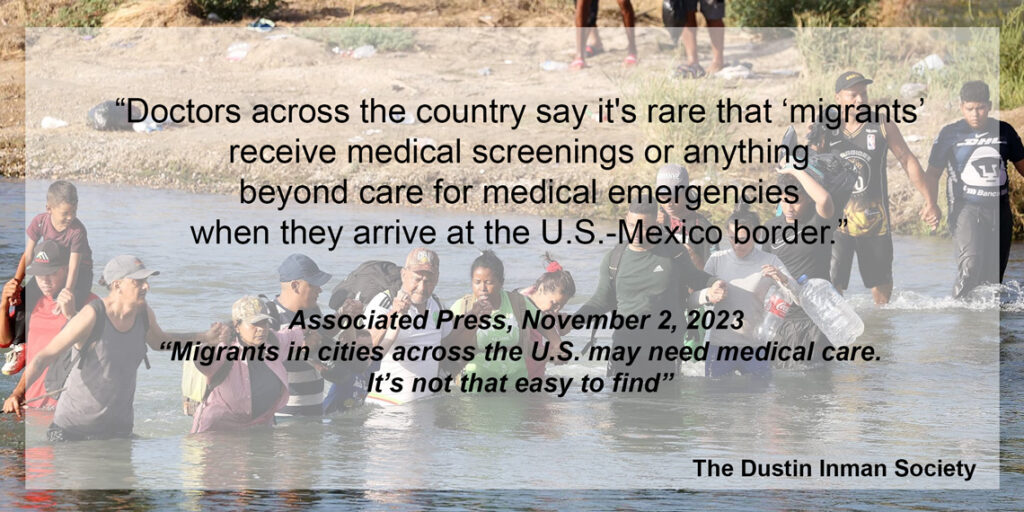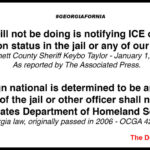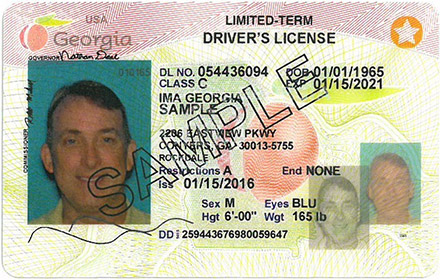
Transcript by Rev.com
My cost: $76.00 and about two hours, not counting the day in the Capitol.
Rep Jesse Petrea:
… a federal government to control illegal immigration affects the people we represent. And it affects their public safety sometimes. And we do have the ability to do this. We do have the ability to inform the citizens of this state of the degree to which criminal illegals in our state impacts their public safety. And so this bill is about just that. Do we want to make sure that without having to somehow, uh, submit a Freedom of Information Act, and try to discover how, how, how big this issue is from the department, do we wanna require the department to regularly, on a quarterly basis, simply post the aggregated data, no specifics, aggregated data on the degree to which this issue is a problem in this state?
So I’m gonna ask you now to look at, if all of you would look at this list of ICE detainers I gave you. So this is an example, it gives you a picture, basically, of what I want. There’s nobody’s name, there’s nothing. Now, as I said in the subcommittee, if you want specifics, you can look at every inmate in the system online. You can go and get their name, everything, where are they from, where com- they committed a crime, what they did. It’s not what I want. What I want is the people to have a snapshot of the problem or the lack of a problem. ‘Cause some people will tell you, you probably got some folks in this room that’ll tell you, “This isn’t a problem at all.” That’s okay. That’s their right. It’s not my job to interpret whether it’s a problem or not for others. I see this as my job to let you determine the degree of the problem so you can make your own decision about whether it’s a problem.
But I want you to look at this list, and I want you to see this aggregated format, and so when you look at this real simply, I want you to note here that there are, there are today, okay? And again, you may think, “Ah, it’s a low number.” You may think that’s a, a, a … an appalling number. I don’t know. But there are 230 child molesters who came to this country illegally, today, in Georgia, who molested children. Okay. There are, today, in our correctional system, 176 murders in our state correctional system. Okay? Who came to this country illegally first, that’s one thing, and then they subsequently committed a murder in the state of Georgia on the people we represent. Okay?
Keep going down the list. There’s 157 people who came to this country illegally, today, in the Georgia correctional system, who then subsequently raped someone, one of our constituents, in the state of Georgia and is now in our correctional system. Now, you may not be interested in knowing any of that, or caring. You may not believe that that was, as I call it, an avoidable crime. Maybe you don’t think that was an avoidable crime. I believe it was. And so I want this information to be made available to our people.
So I wanna make one thing clear, though, about this list, as I alluded to earlier. As you look at this list of 1,505, and I’m gonna give you an update on this, ’cause I want you to note at the top, this is December of this year. December, I mean, of 2022, December. But I want you to note something. My friends, this is not a list of all the criminal illegals in our Georgia correctional system. It is a list of those with ICE detainers. So let me explain now the conundrum, there. Why do I point that out?
I point that out because of this. I just want you to hear me. This is facts. In 2019, ICE issued 165,000 detainers in the United States. Okay? In 2022, ICE issued 78,000 detainers in the United States. ICE detainers have plummeted under the Biden administration. And in spite of the huge increases that everyone in this country, of every party, recognizes [inaudible 00:04:33] the last few years, there has been a 55% decrease in the number of detainers issued since 2019.
So, why do I tell you that? Because if you only have a list of ICE detainers, you don’t really have an accurate picture of what I’m trying to get at. What I’m trying to get at is how many illegal criminals are in this syste- uh, yeah, people illegally here are in our correctional system? If you only have ICE detainers, you have a subset of that. Now, because I can’t get that number from the department, I don’t know whether this is the … I, I hope this is the majority. But we don’t really know that. Okay? Because as you heard from the numbers I just mentioned, today, many people in the syst- the, the, the Feds are simply not issuing detainers on everyone. I hope that, I hope that makes sense.
So, uh, Mr. Chairman, there’s one last thing I’d like to mention, because there was a good question, uh, where is Representative Neal? She’s not here. She had some good questions. And I wanna mention this. Uh, today’s data, and when I say today, let me be clear again, I wanna be precise in everything I say, yesterday, (laughs) yesterday’s data, there were f- You see 1,505 here, of ICE detainers. There are now 1,532 today, yesterday. And to m- To Representative Neal’s very good gr- uh, question, eight of those are duplicated on this list. She asked about this list.
So there are eight. So there are really 1,524 on yesterday, criminal illegals in the Georgia correctional system with ICE detainers. I hope that’s clear. So there are eight duplications. So by and large, when you look at this list, yes, you’re looking at individuals. But there are occasionally a situ- eight times out of these 1,505, there is a duplication.
Okay. So there’s one last thing I’ll say beyond that, Mr. Chairman, that is this. This relates only to the Department of Corrections. Okay? So this has nothing to do with jails, your municipal or county jails, sheriffs, all of those things, that’s another matter. This is the issue that … This is an issue I think’s perfectly appropriate for us to address, ’cause this is our state correctional system. And the question at the end of the day is should the people, do the people have a right to know the degree to which this is, uh, affecting their public safety or not? That’s up to all of us to decide. Thank you, Mr. Chairman. I’m glad to answer any questions you might have.
Chairman Collins
I’ve got a couple of questions for you, there- [inaudible 00:07:21]
Rep Jesse Petrea:
Yes sir.
Chairman Collins
So, we know there’s 15, 1,500 illegal aliens in this state that are on ICE detainers.
Rep Jesse Petrea:
Yes sir.
Chairman Collins:
But we do not know how many illegal aliens that we have in our prison system, total. We do not know that.
Rep Jesse Petrea:
Hm. Chairman, we do not.
Chairman Collins
We do not know that. Now, we don’t know that. Somebody-
Rep Jesse Petrea:
That doesn’t mean we don’t know that.
Chairman Collins
Somebody probably knows that.
Rep Jesse Petrea:
I don’t know that.
Chairman Collins
But they’re not sharing that information with us.
Rep Jesse Petrea:
My understanding, and the department is welcome to speak, my understanding from talking to probably the most knowledgeable guy I’ve ever spoken to on this issue, Mr. John Feere, who is a chief of staff to Tom Homan the director of ICE, and two other directors, is that this information is all available, when our, our correctional system uses a, a, a … has a memorandum of agreement with a, a program called 287(g). So when you … You, you know, and you know, I’m not in the system, so I’ll, I explain it the best way I can. When you admit someone you … that … You are communicating with ICE to determine their status. Okay? Whether they’re here illegally or not.
My understanding from ICE is that they, they are going to know who is here illegally or not. Now, I can’t tell you what the department’s gonna say, ’cause we’ve been kinda round and round on that. But here’s the deal. They tell me, “You’re gonna know.” Now, that doesn’t mean they’re not all gonna have an ICE detainer, because again, you’re only gonna have a detainer if the Feds choose to pursue that individual, and for a myriad of reasons, as I discovered from talking to Mr. Feere] and others, they don’t always do that. And they particularly haven’t done that in the last couple of years. Because what the Biden demonstration has done, has decided that, “Well, we’re only interested in priority cases.” So you’re not gonna capture the totality of the problem. So, Mr. Chairman, now, this is a long answer to your question, but I don’t know the total number. But I will promise you this. It is more than the list of ICE detainers.
Chairman Collins
Okay.
Rep Jesse Petrea:
I cannot tell you the degree to which it is more than that. Thank you, Mr. Chairman.
Chairman Collins
Any questions for the author, for the bill, before we hear from anybody from DOC? Any questions? All right.
Rep Jesse Petrea:
Representative Evans?
Speaker 2:
Thank you.
Rep Becky Evans:
Thank you. Um, so just to be clear, for the, for the purpose of the bill, this … How does, how does this improve our public safety if we have this bill?
Rep Jesse Petrea:
That’s a good question. I tried to answer it in the subcommittee as well, and I’ll do it again, uh, Representative, so here’s the deal. Uh, I believe that, uh, the people should know. You know, we’re dealing with a multitude of issues today. We’re talking about, um, some challenges we have with district attorneys, a multitude of things that relate to our public safety. Um, but in order to, to understand the problem in the realm of public safety, we s- we, we need to know where the problem is. Now, we all know that the, that, that overwhelmingly, because of the overwhelming difference in population, that our home- Listen. We got enough home-grown criminals to keep us busy, don’t we? We cer- We certainly do.
But the degree to which, if, if someone is interested in whether or not this country is, uh, and their … and the lack of following our immigration laws is impacting our lives, um, I believe the people have a right to know that. So I believe that offering information is beneficial to society. That’s, that’s me, personally. Now, there are folks … So the mantra, generally, is this. Uh, beca- And I will tell you, the first thing I wanna say is the overwhelming majority of, uh, not only immigrants, but even illegal immigrants in this country, uh, are, are, are, are, are good people. They’re good people.
That doesn’t change what I said earlier. The majority of cri- the majority of society are good people. But every criminal alien in this country who then commits a crime on our people was an avoidable crime. Okay? And so I believe educating people on the degree to which is this is a problem, helps them to make a more informed decision about whether they care about the issue of illegal r- immigration or not. That’s the best I can answer that. Okay?
Rep Becky Evans:
Chairman? May I- [inaudible 00:11:56]
Rep Jesse Petrea:
It’s a matter if do they need-
Speaker 2:
Go ahead.
Rep Jesse Petrea:
… to see it or not.
Rep Becky Evans:
Okay.
Speaker 2:
Go ahead.
Rep Becky Evans:
Yeah. So, I know you … You know, it’s a good point, you wanna talk about what the problem is. But I, I … One of my, uh, fears about this, this type of bill is that, um, we have, you know, a … We have had a rise in, in, you know, hate, uh, you know, hate crimes, you know, across our country. And we had this incident, you know, in El Paso, um, where a gentleman came in and shot a bunch of, you know, Hispanic people, because of this, you know, huge criminal, illegal, uh, invasion coming across our border. And, um, I’m concerned about the impact of, uh, of, of this contributing to anti immigrant, um, sentiment.
Rep Jesse Petrea:
Uh, Representative, I appreciate your comment, but I, I have a hard time fathoming that. I mean, what, what we’re doing is simply saying that the data that is specifically already in … Uh, we’re aggregating the data to show the breadth of a problem that has nothing … I m- I mentioned to the subcommittee the other day, and this is, this isn’t any … You know, there’s this tendency. Actually, it’s an, it’s an, uh, it, it’s routine and it’s done on purpose, to kinda pigeonhole this as relating to one group. There’s 100 … There’s 1,505, here. 150 of ’em, I was looking around the webs- 150 of ’em are Germans.
So we have a problem in this country, uh, by the way, the immigration problem, uh, a huge proportion of it is overstayed visas. These aren’t people com- crossing a border. This … There, there’s an issue. It doesn’t matter where you’re from. The issue is are people criminally here? And then, they commit crimes on our country. And quite frankly, here’s what’s happening. Many of those individuals who are criminally he- or illegally here in the first place, then commit a crime, often violent or sexual, like these, are never even deported after they serve their time. They’re not even deported.
Speaker 2:
Repeat that-
Rep Jesse Petrea:
And the answers-
Speaker 2:
… one … Repeat that more time.
Rep Jesse Petrea:
Not everyone is deported after serving, uh, their cri- their time in this country for a crime against our constituents. They aren’t all deported. By virtue of the fact that I just told you, they don’t all of ICE detainers.
Speaker 2:
Right.
Rep Jesse Petrea:
They are not deported. But, uh, but every, every common sensical person I represent would say, “Listen. You’re breaking the law getting here and then you assault our people? You attack our people? You commit crimes against our people?” Surely we could all agree that those individuals should be removed. That’s not the case. So-
Speaker 2:
Yeah.
Rep Jesse Petrea:
Listen. Uh, uh, I, I … You know, I don’t wanna get in too big of a debate on that, but that’s the reason I believe the people have a right. Now, the question is do people have a right to know the degree of this problem or not?
Speaker 2:
Well- [inaudible 00:14:34]
Rep Jesse Petrea:
Well, listen, the mantra is often, uh, that these people who are mostly good people, that are maybe here illegally, I will tell you, overwhelmingly, good, hard-working people who don’t like, who don’t … who, who oftentimes are the victims of these crimes.
Speaker 2:
Absolutely.
Rep Jesse Petrea:
Let me be clear. And I’ve talked to a multitude of people, le- legal immigrants here, who are 100% behind me.
Speaker 2:
Number 16.
Rep Jesse Petrea:
Now let me … Mr. Chairman, could I say one more thing?
Speaker 2:
Please.
Rep Jesse Petrea:
The mantra from the other side, which has an agenda, is that the only crimes these folks commit are speeding tickets and parking tickets, that’s it. They’re just parking tickets, speed ti- You’re gonna deport people for parking tickets, speeding tickets. There ain’t nobody deporting somebody over parking tickets, speeding tickets. My friends, there’s no speeding tickets on here. There’s no, there’s, there’s, that’s, that’s … It’s simply not true. Okay? [inaudible 00:15:23]-
Speaker 2:
Representative Frazier, you had a question?
Speaker 4:
[inaudible 00:15:25] a conversation.
Speaker 2:
Oh.
Speaker 4:
Please- [inaudible 00:15:28]
Speaker 2:
Who’s number 16 down there? Mi- Representative Cummings, I’m sorry. I was [inaudible 00:15:35] Representative Frazier was there.
Rep Terry Cummings:
Good morning.
Rep Jesse Petrea:
Good morning.
Rep Terry Cummings:
Um, it’s my understanding that a lotta times, um, undocumented immigrants do not report crimes, for fear of being taken in and deported. How do you feel that this bill will further kind of, um, increase that?
Rep Jesse Petrea:
Well, I’d, I, I … So this relates only to those already in the criminal justice system, in our prisons, so I don’t understand how it could impact that at all.
Rep Terry Cummings:
Because you’re still gonna have-
Rep Jesse Petrea:
You-
Rep Terry Cummings:
… more arrests.
Rep Jesse Petrea:
Say again?
Rep Terry Cummings:
You’re still … You’re talking about people currently.
Speaker 2:
Yeah.
Rep Terry Cummings:
But there are people coming into the system every day. So the numbers change. That’s why you had the 15 or five change was only ’cause more are coming to the system.
Rep Jesse Petrea:
Look, but Representative, my point is that what happens in the, in the community with your, uh, with your law enforcement in the community, has nothing to do with this. This bill is only … So, so to be clear, this bill doesn’t affect anyth- anyone, uh, or anything unless they’re already admitted into the state prison system, not even on a local level. But once they’re there, there is a re- There is an agreement, where we discover, “Okay, inmate number 22 is now admitted.” We discover whether they’re here illegally or not.
And all this does is every 90 days, aggregate the data of the totality of those numbers, uh, for the transparency, for people to understand, that agreed to which it either is, or in their mind, isn’t a problem. So I d- I … Uh, uh, I’m I respect your question, but I, I don’t understand how it could fact- affect them, anyway. ‘Cause all it does is educate (laughs) people on those that are already in the correctional system.
Rep Terry Cummings:
I tend to s-
Rep Jesse Petrea:
Not that it does, doesn’t deal with the community in any way, shape, or form.
Rep Terry Cummings:
I tend to see things, sometimes, as unintended consequences, and that’s what my concern is with, with this. The other concern is, um, you said that you wanted countries identified, so if you find out that a specific number or a large number are coming from one particular country, what would the resolution be to that?
Rep Jesse Petrea:
Well, there is no res- Again, there’s no resolution. This is, this is providing data to the people. Now, you can go on … so, t- to be clear, you can … So on the website today, you can go to the Department of Corrections, and if you wanna spend a lot of time searching around, there’s a … You can click on foreign inmates. And you can see the self-reported home countries of all these inma- And you can see. You can see so much more than I’m interested in. (laughs) You can see their name, w- where they came from, what they did, when they did it. You can see everything about ’em. I, I’m not interested in all that. So, w-
Robert:
But the answer to your question is this, let’s say that, let’s say that you look and you see there’s, ah, you know, 105 [inaudible 00:00:12], 150 from Germany. Those are obviously over-stayed visas. And you see a multitude of others. It tells you… You might see, y- you might see a list of those that are on terrorist watch lists of nations. I don’t know. I don’t know. But there’s a… W- Why would we not want the totality of that information to be shared, as long as it’s aggregated? It’s not specific.
Chair:
Hold on, hold on one moment, please.
Rep Sainz:
But that’s my question. I’m sorry, Chairman. I’m-
Chair:
President [inaudible 00:00:37], you had a question?
Speaker 3:
A couple of quick ones. Um, would you not agree that it’s in, in mentioning unintended consequences, would you not agree, uh, um, that this, your bill addresses the unintended consequences of our, uh, lapsed, uh, enforcement of illegal immigration? This is an unintended consequence?
Robert:
Yes, sir, I would agree wholeheartedly.
Speaker 3:
And in relation to my colleagues mentioning of anti-immigrant behavior, would you not agree that you have faith in your constituencies, and the constituencies of, of the members here that the, that our citizens who are looking at this information can distinctify the difference between those who violate our laws, not once, but twice, by first coming into this country illegally, and then second, violating in a dangerous fashion and creating victims in our nation. And legal immigrants like, for example, my own mother, who I can attest is a wonderful lady and a legal immigrant, who.. Do you think that that separation is clear to the, to our constituencies
Robert:
I think it is representative, and indeed, I met your mother and a lovely lady she is.
Speaker 3:
Appreciate it.
Chair:
Number 10, we got down there.
Speaker 4:
[inaudible 00:01:42].
Chair:
Representative, go ahead.
Speaker 4:
Yes, sir. Yeah, I just want to thank you for bringing this bill. Ah, you know, the information that you’re communicating to the American public is very valuable information that, at the end of the day, you know, we, we should have as an informed… I mean, we should do everything we can to inform the public about all the various issues that, that face our country so that they can make intelligent decisions about how they want their, their leaders to, ah, to run their country. So I appreciate this and, and the information and, and what this bill does.
Chair:
We’ve got 10 members that are going to be speak… Two, two folks out there in the audience that want to speak and give some testimony.
Speaker 4:
Yes, sir.
Chair:
Ms. Stamps. I’m sorry?
Ms. STamper:
Stamper.
Chair:
Stamper, I’m sorry. Ms. Stamper, if you want to go to the podium.
Speaker 4:
Mr. Chairman, I’m going to take my seat back over here, thank you.
Ms. STamper:
How long do I have to speak?
Chair:
I think brevity’s going to be your friend here, because we have another bill.
Ms. STamper:
Okay, great. Hi, my name is Katy Stamper and I’m a lawyer. I live in Woodstock. I only work part-time, so don’t call me for any business, okay? Um, I’ve come here to speak about this bill because I’m very troubled that I even have to come down here and talk about it. We don’t want our country to turn into another country. So as the author of the bill said, this gives us information to know how bad the problem is. And we’re entitled to have that information.
And when you talk about the shooting in El Paso, we have a right to be angry at illegal aliens. We have a right to be angry at our federal government for not enforcing our border. We have a right to be upset that illegal aliens go into our hospitals and get free dialysis twice a week. We have a right to be, to object to that.
I don’t like the idea that this would eve be a question. There should be a presumption that we are given this knowledge. It should be a rubber stamp. Because if I don’t do something that y’all want me to do, I get in trouble and I get harassed about it. Why would illegal aliens be treated any differently? Why would we want.. Why would we not want to know? Why is our Governor Kemp, who campaigned on getting his truck, why is nobody doing anything about deporting these people?
So I would like to know why you don’t contact our Senators and say to them, “Why aren’t you pressuring President Bilen, Biden and Mayorkas to enforce the border, instead of worrying about prejudice against illegal aliens?”
Chair:
Ma’am, if you wold, if you have another comment about the bill, that’s fine. You can speak about the bill, but we’re not going to direct specific comments.
Ms. STamper:
Well, I’m sorry-
Chair:
And I think we all, we all have a reason to be mad when someone goes in and kills innocent people. I, I don’t appreciate your comments there.
Ms. STamper:
What do you mean?
Chair:
When you were specifying that direct from there.
Ms. STamper:
I’m-
Chair:
When you were directing your comments about we should be angry. We should not necessarily be angry. We should be concerned, but I, I don’t think we want to make light of the situation where innocent people were killed.
Ms. STamper:
I’m not making light of anything.
Chair:
Well, I, I take your-
Ms. STamper:
I’m not making light of anything. What this committee-
Chair:
I think your time-
Ms. STamper:
… is doing.
Chair:
I think your time speaking is over with and you have, you have made it very clear that you support this bill, and I appreciate your comments. If you’ll please take your seat.
Ms. STamper:
Sure.
Chair:
We’ll move on. Thank you.
Speaker 6:
[inaudible 00:05:10], Mr. Chairman.
Chair:
The next person we have is, ah, Mr. D.A. Keen.
D.A. King:
Thank you, Mr. Chairman. Members of the committee, my name is D.A. King. I use my initials because my mom named me Donald Arthur King and I’m afraid somebody would confuse me with the other Don King, so. If I live until April, I’ll be 71 years old. I started coming to this campus in tw-… in 2004 to educate legislators on illegal immigration. And we passed a lot of laws I helped draft, I helped pass, I’ve held rallies. I’ve urged, pleaded, debated and pushed. We have a lot of laws on the books here in Georgia aimed at illegal immigration.
I came today to thank State Representative Jesse Petrea, who is a very dear friend of mine, for introducing this bill. I’m here to support the bill. I run a nonprofit called the Dustin Inman Society. The Dustin Inman Society is named after a Woodstock youth who is forever 16 years old because we do not enforce our immigration laws.
At the minium, I hope this bill passes as it is so that we can at least have a look into the price, the cost, not just the human cost, but the monetary cost of the criminal aliens that are in the state prison system. I can’t imagine, I can’t imagine the upside to not passing this bill as is. Further, I can’t imagine anybody who would try to downgrade it to include only detainers.
As State Representative Jesse Petrea has said, that is a very small portion of the total illegal aliens in the prison system. Uh, Representative Petrea quoted a very dear friend of mine who I’d known for a long time on, on, wh- who worked for ICE. He is exactly right and I’m going to get done in a minute, but I want to say this to all the legislators here. Representative Petrea has learned a lot because he did his research on illegal immigration in a state where, folks, we have more illegal aliens in Georgia than they have in Arizona.
We have more illegal aliens in Georgia than we have Green Card holders. I admire and thank Representative Petrea from here and sincerely, while I look everybody in the eye on this panel, if you will spend the amount of time and show the interest in illegal immigration that Representative Petrea has, I will come to your house and I will wash your car.
It’s very, very important that this bill passes. I hope you’ll pass it out today. I can stand here and speak forever, but it’s a good bill. It’s worthy of your vote and if we don’t pass it, people are going to be asking a lot of questions about why not. I am more than happy to take any questions.
Chair:
Okay. Ah, thank you.
D.A. King:
Thank you, Mr. Chair.
Chair:
Any questions? I don’t think there’s any questions at this time. We have someone from the Department of Corrections that would, uh, be, be having testimony [inaudible 00:08:36] after this, before we, we [inaudible 00:08:37] the question on this?
Rob Thrower:
Yeah, I’ll be brief, Mr. Chairman. Um, first I just want to thank Chairman Petrea, ah, for his willingness to work together and for being transparent and honest with us of the direction of the bill. Ah, secondly, anything I say here today, I don’t want it to have any intention of us undermining, uh, our partnership with ICE and the 287 G Agreement.
The folks who work with ICE do a great job and we’re going to continue to work with ICE on the 287 G Agreement. Um, at this juncture between the department and the current version of the bill, there just is a disagreement about the language as it stands. Um, there’s a substitute out there that, ah, would accomplish what the department sees as what it can get its hands on, right now and publish.
And, you know, my intent today is not to be adversarial in any, way, shape or form. I’m just a mutual fact finder on some of the questions that you may have. So if there’s no questions, I’ll take my seat.
Chair:
Good, that’s fine. Number 19, you have a question? Do you have-
Rep Bill Werkheiser:
In relation to what you mentioned, what in, what in the bill would you need changing in order to be in support? You said there was a substitute version, ob- obviously not in front of us. So what it, what areas, ah, is the issue it was, I guess.
Chair:
The substitute is not in front of us. The bill that is presented was the bill that was presented in, in a subcommittee, as alluded by the author earlier in his comments. So if you want to answer that question about what it was the department preferred to be in the sub?
Robert:
Yes, sir. I apologize-
Chair:
We’re all friends here, we’re going to be friends after this is over with. Most of us, all of us sitting up here will be. But you feel free to answer that question.
Rob Thrower DOC liaison:
No, and, and I’ll clear that up. There was no substitute introduced. There’s a substitute that we were working on, so I’ll, I’ll clear that up. Apologies there. Ah, the piece about immigration status, um, felt that the might tie the department’s hands in what exactly we’re looking for with immigration status. Ah, the piece that we could… and there was a earlier version of this bill back in 2019, House Bill 202, that we had kind of narrowed down to publishing the information that we currently give, which is the number of ICE detainers broken down by crime.
Ah, the list that I think you have in front of you that we share with, ah, Chairman Petrea from time to time, ah, that is the quantifiable information that we can grab, or we can put our hands on immediately. And we can put it on our website without a bill or with the bill, but that’s what we can concretely put our hands on.
So, the immigration status was a bit confusing about what the intention was, and what we have, and what, how we could make that work.
Chair:
Thank you. One question I do have for you Rob, if you don’t mind, what’s it cost to house someone in our prison system?
Rob Thrower:
$73 a day.
Chair:
$73 a day. Okay. Wow. Do we have any more questions for the department? Number 29 over here. [inaudible 00:11:55].
Rep Bill Werkhieser:
Thank you, Chairman. Is there no reason that we could not, um, consider substitute, since the department that we’re asking to do this is saying they cannot even do the current version of the bill?
Speaker 12:
Mr Chairman, you have the ability to, to-
Speaker 13:
I would like to make a motion that we accept, ah, substitute-
Chair:
We’re, we’re not ready to do, to do that yet. But at the appropriate time, the Chair will be more than, ah, pleased to, ah, intro-… to recognize you. Number 26, that’s Chairman Petrea.
Rep Jesse Petrea:
Mr. Chairman, to be clear, ah, Chairman Werkeizer just misspoke. He just said that the department cannot do this. That is inaccurate. Ah, Mr. Thrower did not say they cannot do it. You’ve heard him allude to the fact that, I think you said, I’m not going to put words in your mouth, and by the way, this young man has been enormously helpful to me. The department has been extremely helpful in every way.
What he said was, “It’s easy to get today.” Remember, we’ve got a little bit of a disconnect here between what I’m hearing from ICE, but this information… So I want you to contemplate something. Contemplate that someone has been arrested in the community, been found to be guilty. They’ve gone through all their… They’re not in our state prison system. They’re not in a county jail. They’re in our state prison system. And then I want you to imagine that we honestly don’t even know whether they’re here illegally or not.
Isn’t that hard to understand? It would seem that we would know that. And of course, we have 287 G. So I don’t think that now, so I’m going to ask Rob, to answer the question. Is it that you cannot do it, or that it is easier to do it with only ICE detainers which would be a subset of those that are in the system?
Rob Thrower DOC:
The ICE detainer information is, like I said, what we can put our hands on. The immigration status piece starts, you know, in my opinion getting into, um, did somebody walk over the border illegally? Did somebody have an education visa that’s expired? Did somebody have a work visa that’s expired, or [inaudible 00:14:06] has ICE identified somebody that’s, um, in violation of some form of immigration law that’s given them probably cause to put a detainer on.
And so, I.. We don’t have that information. When they send the detainer to us, they just say, “We have probably cause that this individual, ah, rises to the level of putting a detainer on them, and, you know, we’ve got the process of putting it in their file and contacting them after the sentence has expired.”
So that’s where I was going with the, ah, information that we have and what we can provide.
Rep Jesse Petrea:
Is that, is that clear to everybody? I’m still trying to process that, but let me come back to you in just a sec. Number 20 down there, is that-
Speaker 16:
Yeah, and mine’s following on the exact same thing we’re all talking about now, is, ah, is your inability to provide the information, or a, again it, it-… This bill would require that, so if, if it was a requirement, could that information then be obtained because there was a reason to, and there’s no reason to get it now? Is that, is that what it amounts to?
Rob Thrower:
Well again, I don’t want to speak for what we can and can’t do under our 287 G Agreement. Um, you know, the information that is requested upon us when we get the email that says, “Can you provide the information of the number of detainers broken down by crime?” I can get you the number of detainers that we have on file in the system currently today. Um, the other stuff, I, I can break it own by crime, I can give you total numbers, but the other stuff is stuff that I just can’t put my hands on concretely to turn back over-
Rep Jesse Petrea:
So would the federal government, you think they would not give that to you if you asked for it?
Robert:
It would probably have to be, and, and I’m just, I, I don’t sit on our 287 G steering committee. But what it’d probably have to be is some kind of an agreement to our current 287 G MOA.
Rep Jesse Petrea:
But that could be done, right?
Robert:
[inaudible 00:16:13].
Rep Jesse Petrea:
We could make that agreement?
Robert:
Yeah, I’m not saying it couldn’t be done.
Rep Jesse Petrea:
Okay.
Chair:
Good, all right. Ah, we’re going to-
Speaker 17:
Mr. Chairman-
Chair:
No, sir,
Speaker 17:
[inaudible 00:16:21].
Chair:
No, sir, no sir. You got to sit down. You got a order. You got a order. All right, let’s see. I think there’s number 29 down there. Yes, sir. [inaudible 00:16:29], please.
Speaker 19:
Thank you, Mr. Chairman. I’m just trying to clarify your statement. So you’re saying the State of Georgia Department of Corrections does not ne-… know for sure who’s an illegal immigrant in our prison system today?
Robert:
What I’m saying is that we know who ICE has identified somebody with probably cause to put a detainer on. I don’t know the status or what the reasoning behind the probably cause that they have to put a detainer on him. But I just know they have a detainer. I don’t know the reasons why, for why a detainer’s been placed on an individual.
Chair:
Okay, all right. Let’s see here. All right, no further, no further questions at this time. We have talked about this bill in subcommittee, and we talked about this bill here today. And I know that members of the committee share, share the concerns, ah, that I do and some don’t. Ah, and now that it’s time, ah, we move forward, what would be the desire and the will of this committee, ah, in reference to House Bill 136? Motion made, duly passed? Second? All those in favor, please say aye?
Room:
Aye.
Chair:
All those opposed?
Room:
No.
Chair:
Okay, we’re going to move for division. All those, ah, aye, please raise your right hand for yes. 11, [inaudible 00:17:53] 11.
All those opposed, same sign. One, two, three, four, [inaudible 00:18:01]. The bill passes with a vote of 11 to support it and four against. Thank you all for attending today. We have one more bill. For those of you who would like to, ah, be dismissed, you can be…




































You must be logged in to post a comment.